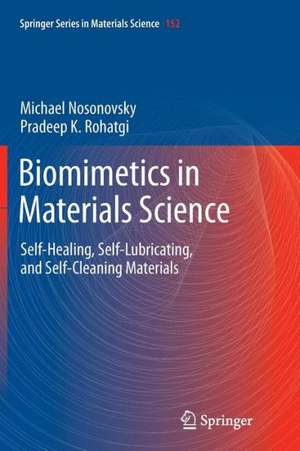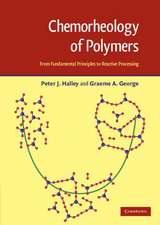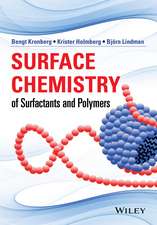Biomimetics in Materials Science: Self-Healing, Self-Lubricating, and Self-Cleaning Materials: Springer Series in Materials Science, cartea 152
Autor Michael Nosonovsky, Pradeep K. Rohatgien Limba Engleză Paperback – 3 mar 2014
| Toate formatele și edițiile | Preț | Express |
|---|---|---|
| Paperback (1) | 951.29 lei 6-8 săpt. | |
| Springer – 3 mar 2014 | 951.29 lei 6-8 săpt. | |
| Hardback (1) | 956.03 lei 6-8 săpt. | |
| Springer – 6 dec 2011 | 956.03 lei 6-8 săpt. |
Din seria Springer Series in Materials Science
- 18%
 Preț: 1820.22 lei
Preț: 1820.22 lei - 18%
 Preț: 776.09 lei
Preț: 776.09 lei - 24%
 Preț: 689.69 lei
Preț: 689.69 lei - 18%
 Preț: 968.96 lei
Preț: 968.96 lei - 20%
 Preț: 568.95 lei
Preț: 568.95 lei - 18%
 Preț: 953.65 lei
Preț: 953.65 lei - 18%
 Preț: 902.36 lei
Preț: 902.36 lei - 18%
 Preț: 953.65 lei
Preț: 953.65 lei - 20%
 Preț: 948.42 lei
Preț: 948.42 lei - 18%
 Preț: 1143.07 lei
Preț: 1143.07 lei - 18%
 Preț: 1111.53 lei
Preț: 1111.53 lei - 18%
 Preț: 1103.62 lei
Preț: 1103.62 lei - 18%
 Preț: 1225.94 lei
Preț: 1225.94 lei -
 Preț: 473.91 lei
Preț: 473.91 lei - 18%
 Preț: 782.42 lei
Preț: 782.42 lei -
 Preț: 433.47 lei
Preț: 433.47 lei - 18%
 Preț: 1116.40 lei
Preț: 1116.40 lei - 18%
 Preț: 946.24 lei
Preț: 946.24 lei - 18%
 Preț: 945.20 lei
Preț: 945.20 lei - 18%
 Preț: 1114.21 lei
Preț: 1114.21 lei - 15%
 Preț: 641.20 lei
Preț: 641.20 lei - 18%
 Preț: 958.56 lei
Preț: 958.56 lei - 18%
 Preț: 1224.36 lei
Preț: 1224.36 lei - 15%
 Preț: 644.82 lei
Preț: 644.82 lei - 24%
 Preț: 833.45 lei
Preț: 833.45 lei - 24%
 Preț: 1060.36 lei
Preț: 1060.36 lei - 18%
 Preț: 964.10 lei
Preț: 964.10 lei - 18%
 Preț: 1224.36 lei
Preț: 1224.36 lei - 18%
 Preț: 1221.20 lei
Preț: 1221.20 lei - 18%
 Preț: 946.87 lei
Preț: 946.87 lei - 18%
 Preț: 1836.92 lei
Preț: 1836.92 lei - 15%
 Preț: 643.34 lei
Preț: 643.34 lei - 18%
 Preț: 1246.32 lei
Preț: 1246.32 lei - 18%
 Preț: 956.81 lei
Preț: 956.81 lei - 18%
 Preț: 953.52 lei
Preț: 953.52 lei - 15%
 Preț: 637.59 lei
Preț: 637.59 lei
Preț: 951.29 lei
Preț vechi: 1160.10 lei
-18% Nou
Puncte Express: 1427
Preț estimativ în valută:
182.05€ • 197.68$ • 152.92£
182.05€ • 197.68$ • 152.92£
Carte tipărită la comandă
Livrare economică 23 aprilie-07 mai
Preluare comenzi: 021 569.72.76
Specificații
ISBN-13: 9781493900503
ISBN-10: 1493900501
Pagini: 444
Ilustrații: XXVI, 418 p.
Dimensiuni: 155 x 235 x 23 mm
Greutate: 0.61 kg
Ediția:2012
Editura: Springer
Colecția Springer
Seria Springer Series in Materials Science
Locul publicării:New York, NY, United States
ISBN-10: 1493900501
Pagini: 444
Ilustrații: XXVI, 418 p.
Dimensiuni: 155 x 235 x 23 mm
Greutate: 0.61 kg
Ediția:2012
Editura: Springer
Colecția Springer
Seria Springer Series in Materials Science
Locul publicării:New York, NY, United States
Public țintă
ResearchCuprins
Preface.- Chapter 1. Introduction.- PART ONE. SELF-HEALING MATERIALS.- Chapter 2. Thermodynamic principles of self-healing in metallic materials.- Chapter 3. Case study of self-healing in metallic composite with embedded low melting temperature solders.- Chapter 4. Surface healing: a case study.- Chapter 5. Development of Metallic and metal matrix composite self-healing materials.- PART TWO. SELF-LUBRICATING MATERIALS.- Chapter 6. Friction, wear, and self-lubrication.- Chapter 7. Thermodynamic methods in tribology and friction-induced self-organization.- Chapter 8. Tribological properties of metal matrix composites.- PART THREE. SELF-CLEANING MATERIALS.- Chapter 9. Thermodynamic foundations of wetting and capillary phenomena.- Chapter 10. Superhydrophobicity.- Chapter 11. Lotus-effect and self-cleaning.- Chapter 12. Self-cleaning in the water flow.- Chapter 13. Artificial self-cleaning surfaces.- Chapter 14. Outlook.
Notă biografică
Dr. Michael Nosonovsky is an Assistant Professor at the University of Wisconsin, Milwaukee (UWM). He is a co-author of one monograph, ten book chapters, and more than 50 research articles. For his work on the Lotus effect and biomimetic surfaces, he was honored with the 2008 Burt L. Newkirk Award by ASME.
Dr. Pradeep K. Rohatgi is Wisconsin Distinguished Professor and Director of the UWM Center for Composites. He is a pioneer in the field of composite materials, particularly metal matrix composites. Rohatgi has coauthored and edited eleven books and over four hundred scientific papers, and holds 20 U.S. patents. In 2006, he was honored with the "Rohatgi Honorary Symposium" on Solidification Processing of Metal Matrix Composites by The Minerals, Metals and Materials Society.
Dr. Pradeep K. Rohatgi is Wisconsin Distinguished Professor and Director of the UWM Center for Composites. He is a pioneer in the field of composite materials, particularly metal matrix composites. Rohatgi has coauthored and edited eleven books and over four hundred scientific papers, and holds 20 U.S. patents. In 2006, he was honored with the "Rohatgi Honorary Symposium" on Solidification Processing of Metal Matrix Composites by The Minerals, Metals and Materials Society.
Textul de pe ultima copertă
Biomimetics in Materials Science provides a comprehensive theoretical and practical review of biomimetic materials with self-healing, self-lubricating and self-cleaning properties. These three topics are closely related and constitute rapidly developing areas of study. The field of self-healing materials requires a new conceptual understanding of this biomimetic technology, which is in contrast to traditional engineering processes such as wear and fatigue. Biomimetics in Materials Science is the first monograph to be devoted to these materials. A new theoretical framework for these processes is presented based on the concept of multi-scale structure of entropy and non-equilibrium thermodynamics, together with a detailed review of the available technology. The latter includes experimental, modeling, and simulation results obtained on self-healing/lubricating/cleaning materials since their emergence in the past decade.
Describes smart, biomimetic materials in the context of nanotechnology, biotechnology, and self-organization
Covers self-healing, self-lubricating, and self-cleaning materials with applications to green technologies in areas such as energy, biomedical devices, and defense
Presents a unified approach by leading researchers in the field covering both theoretical and practical issues
Describes smart, biomimetic materials in the context of nanotechnology, biotechnology, and self-organization
Covers self-healing, self-lubricating, and self-cleaning materials with applications to green technologies in areas such as energy, biomedical devices, and defense
Presents a unified approach by leading researchers in the field covering both theoretical and practical issues
Caracteristici
Describes smart, biomimetic materials in the context of nanotechnology, biotechnology, and self-organization Covers self-healing, self-lubricating, and self-cleaning materials with applications to green technologies in areas such as energy, biomedical devices, and defense Presents a unified approach by leading researchers in the field covering both theoretical and practical issues Includes supplementary material: sn.pub/extras









